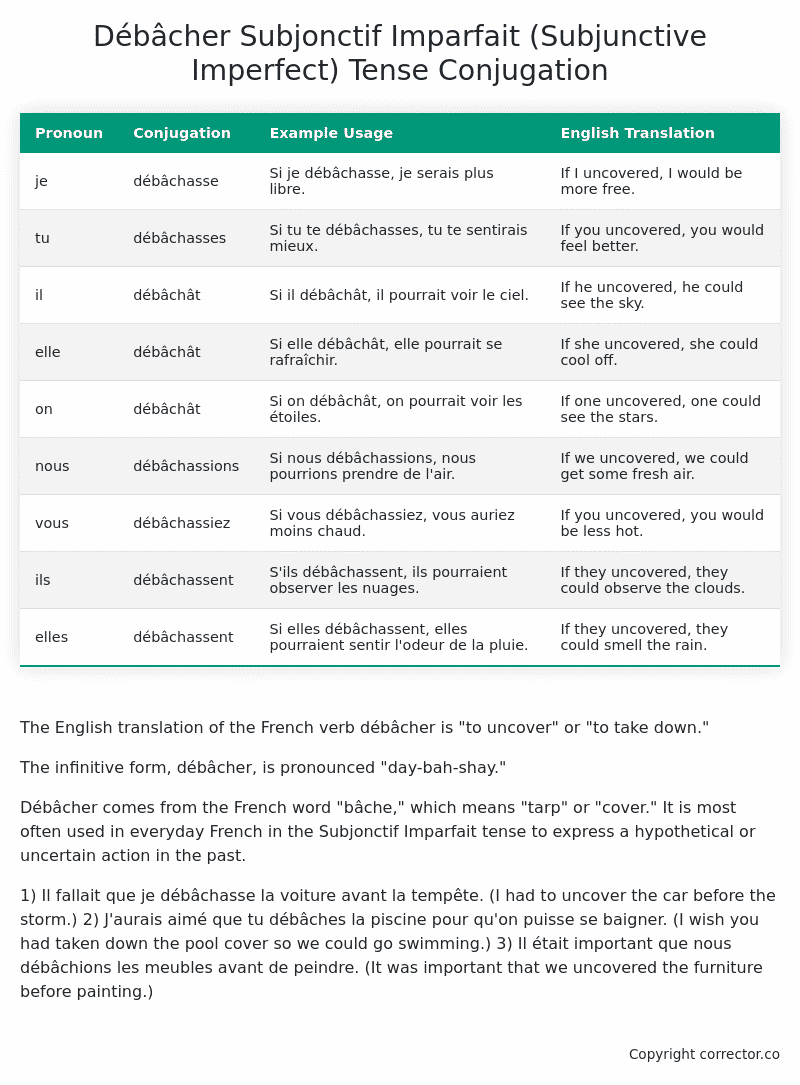Subjonctif Imparfait (Subjunctive Imperfect) Tense Conjugation of the French Verb débâcher
Introduction to the verb débâcher
The English translation of the French verb débâcher is “to uncover” or “to take down.”
The infinitive form, débâcher, is pronounced “day-bah-shay.”
Débâcher comes from the French word “bâche,” which means “tarp” or “cover.” It is most often used in everyday French in the Subjonctif Imparfait tense to express a hypothetical or uncertain action in the past.
1) Il fallait que je débâchasse la voiture avant la tempête. (I had to uncover the car before the storm.)
2) J’aurais aimé que tu débâches la piscine pour qu’on puisse se baigner. (I wish you had taken down the pool cover so we could go swimming.)
3) Il était important que nous débâchions les meubles avant de peindre. (It was important that we uncovered the furniture before painting.)
Table of the Subjonctif Imparfait (Subjunctive Imperfect) Tense Conjugation of débâcher
| Pronoun | Conjugation | Example Usage | English Translation |
|---|---|---|---|
| je | débâchasse | Si je débâchasse, je serais plus libre. | If I uncovered, I would be more free. |
| tu | débâchasses | Si tu te débâchasses, tu te sentirais mieux. | If you uncovered, you would feel better. |
| il | débâchât | Si il débâchât, il pourrait voir le ciel. | If he uncovered, he could see the sky. |
| elle | débâchât | Si elle débâchât, elle pourrait se rafraîchir. | If she uncovered, she could cool off. |
| on | débâchât | Si on débâchât, on pourrait voir les étoiles. | If one uncovered, one could see the stars. |
| nous | débâchassions | Si nous débâchassions, nous pourrions prendre de l’air. | If we uncovered, we could get some fresh air. |
| vous | débâchassiez | Si vous débâchassiez, vous auriez moins chaud. | If you uncovered, you would be less hot. |
| ils | débâchassent | S’ils débâchassent, ils pourraient observer les nuages. | If they uncovered, they could observe the clouds. |
| elles | débâchassent | Si elles débâchassent, elles pourraient sentir l’odeur de la pluie. | If they uncovered, they could smell the rain. |
Other Conjugations for Débâcher.
Le Present (Present Tense) Conjugation of the French Verb débâcher
Imparfait (Imperfect) Tense Conjugation of the French Verb débâcher
Passé Simple (Simple Past) Tense Conjugation of the French Verb débâcher
Passé Composé (Present Perfect) Tense Conjugation of the French Verb débâcher
Futur Simple (Simple Future) Tense Conjugation of the French Verb débâcher
Futur Proche (Near Future) Tense Conjugation of the French Verb débâcher
Plus-que-parfait (Pluperfect) Tense Conjugation of the French Verb débâcher
Passé Antérieur (Past Anterior) Tense Conjugation of the French Verb débâcher
Futur Antérieur (Future Anterior) Tense Conjugation of the French Verb débâcher
Subjonctif Présent (Subjunctive Present) Tense Conjugation of the French Verb débâcher
Subjonctif Passé (Subjunctive Past) Tense Conjugation of the French Verb débâcher
Subjonctif Imparfait (Subjunctive Imperfect) Tense Conjugation of the French Verb débâcher (this article)
Subjonctif Plus-que-parfait (Subjunctive Pluperfect) Tense Conjugation of the French Verb débâcher
Conditionnel Présent (Conditional Present) Tense Conjugation of the French Verb débâcher
Conditionnel Passé (Conditional Past) Tense Conjugation of the French Verb débâcher
L’impératif Présent (Imperative Present) Tense Conjugation of the French Verb débâcher
L’infinitif Présent (Infinitive Present) Tense Conjugation of the French Verb débâcher
Struggling with French verbs or the language in general? Why not use our free French Grammar Checker – no registration required!
Get a FREE Download Study Sheet of this Conjugation 🔥
Simply right click the image below, click “save image” and get your free reference for the débâcher Subjonctif Imparfait tense conjugation!

Débâcher – About the French Subjonctif Imparfait (Subjunctive Imperfect) Tense
Formation
Common Everyday Usage Patterns
Interactions with Other Tenses
Subjonctif Présent
Indicatif Passé Composé
Conditional
Conditional Perfect
Summary
I hope you enjoyed this article on the verb débâcher. Still in a learning mood? Check out another TOTALLY random French verb conjugation!


